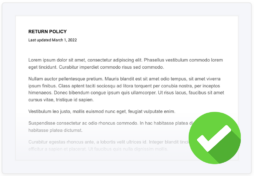A money back guarantee, also known as a satisfaction guarantee, is a statement from a seller promising refunds for dissatisfied customers and is commonly used as a marketing technique to give consumers a sense of safety, especially when purchasing a new product.
A standard money back guarantee addresses which items or services the guarantee applies to and the timeframe for returns.
Below, I explain if your business needs a money back guarantee, what should be included in this policy, and how to easily make one.
How To Make a Money Back Guarantee
You can create a money back guarantee using a generator, a template, or writing one yourself.
Use Termly to Create a Refund Policy
Here’s how you can use Termly’s generator to easily create a comprehensive refund policy that outlines your money back guarantee:
Step 1: Go to Termly’s refund policy generator.
Step 2: Answer our prompts and questions, and go through all of the steps until you reach “Final Details.”
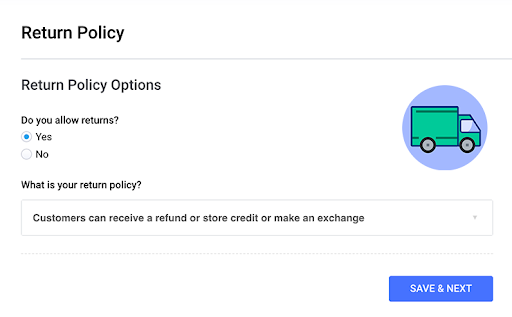
Step 3: Once you’ve filled in everything and you are satisfied with the preview, click “Publish.”
You will then be prompted to create an account on Termly so you can save and edit your return policy further.
Use a Return Policy Template
You can use a return policy template as a framework for your money back guarantee policy — I recommend this method for businesses with very simple return and refund protocols.
All you need to do is fill in the blank sections of the template with information about your business, then add in or customize the money back guarantee details as needed.
Write Your Own Return Policy
You can also write your own return policy featuring a money back guarantee.
If you choose this method, ensure your money back guarantee includes:
- Clear and specific language about what qualifies a customer for a full refund.
- Any obligations customers must fulfill before receiving their payment.
- The timeline in which returns are accepted.
- How long it takes for customers to receive their money back.
- Information about any exceptions.
To avoid customer confusion, I suggest you write your guarantee using easy-to-read, plain language and format it in a straightforward way.
What Is a Money Back Guarantee?
A money back guarantee is a type of return policy that lets consumers know they can return a product and get their money back if they’re dissatisfied.
Typically, only certain items are eligible for a money back guarantee, which should be marked in-store and on any digital pages and listed in full in the policy itself.
Some businesses limit the timeframe for accepting returns for the money back guarantee.
The policy may also be a temporary promotion to attract new customers, and you are typically legally allowed to impose a deadline.
All of these relevant terms regarding the return process should be listed in your money back guarantee policy.
When Do You Need a Money Back Guarantee?
Money back guarantees are not legally required; however, you can use one as a sales technique to attract customers, as it shows confidence in your products.
It’s recommended in the following scenarios:
Although consumer protection laws don’t require money back guarantees, many require companies to honor their money back guarantees if they offer one.
Let’s review some consumer laws from different regions addressing money back guarantees.
Money Back Guarantee Laws in the US
In the US, money back guarantees are not required by law, and a seller may only advertise a money back guarantee if:
- They offer a full refund of the purchaser’s money
- List all requirements and limitations that apply
Some states have additional regulations that are more strict than federal law.
Companies doing business in the US should check applicable state laws before offering a money back guarantee in all 50 states.
Money Back Guarantee Laws in the UK
In the UK, money back guarantees are required in certain circumstances.
According to UK law, customers have 14 days to inform the seller that they no longer want an item and 14 days to return it.
Sellers then have another 14 days to issue refunds once they receive the returned item.
In the UK, refunds are also mandatory for damaged goods.
Money Back Guarantee Laws in the EU
Money back guarantees are also legally required in most of the European Union (EU).
According to EU regulations, customers have a “cooling off” period of 14 days to return a product or cancel a service with no questions asked.
However, products such as customized items, edible items, and digital content are considered non-refundable.
If you offer such items and want to exclude them from a money back guarantee, make it clear to customers that those products fall under your no refund policy.
What To Include in a Money Back Guarantee
Next, I’ll walk you through the three basic parts of a money back guarantee.
Returns Process and Timeframe
You should address the returns process and timeline in your money back guarantee policy.
Start by answering the following questions:
- Does the item need to be returned to receive a refund?
- How many days does the customer have to return it?
- Do the days start counting from the purchase time or the time the item is received?
- Can the item be damaged in any way?
- Does the customer have to give a reason or justify why they’re returning the item?
Then, include your answers in the details of your final policy.
You can set any terms you desire, within reason, so long as you communicate it to customers.
Type of Refund
You must specify what type of refund you offer to customers in your policy.
For example, some types of refunds include:
- Store credit
- Replacement item/item of equal value
- Full refund
- Partial refund
Keep in mind that if you offer a “100% money back guarantee,” this indicates that you will refund the total price of the product or service the customer is returning.
Shipping Costs
If the products you offer must be shipped and returned to you, your money back policy must specify the consumer’s shipping responsibilities and requirements.
Consider linking to a shipping policy that outlines this information.
When deciding on your money-back shipping process, it helps to answer these questions:
- Do you offer free shipping?
- Is shipping only free within the same state/province/region?
- Does the customer need to pay for shipping?
- Does the item have to be returned in the box it came in?
Include your answers as clauses in your money back guarantee policy so consumers know the entire process.
Where Do You Put a Money Back Guarantee?
Once you’ve finalized your money back guarantee, you must display it in several places so customers can easily find your policy, which I’ve summarized for you below.
On Product Pages
Add a link to your money back guarantee to all product pages that the guarantee applies to.
To benefit from the marketing angle of money back guarantees, consider adding a visually appealing stamp or icon to applicable pages highlighting the “Money Back Guarantee.”
Ensure you also link to the full policy somewhere on the page so customers can read the details of the refund policy and process.
On Your Checkout Page
Add a transparently labeled link to your money back guarantee to your website’s checkout page and shopping cart.
Putting it in these locations ensures customers can read it before finalizing a purchase.
You’re providing customers with the details they need, which promotes consumer confidence and may even help reduce cart abandonment rates.
In Your Return Policy
Every ecommerce business should have a return policy, which is the perfect place to include all details about your money back guarantee — it is a type of return policy, after all.
You might do this in two ways:
- Include your money back guarantee as a clause directly in your return policy.
- Have a separate money back guarantee and link to it within your return policy.
- Or do both methods.
Our free refund policy generator creates a refund policy for you and gives you a link or HTML code so that you can place it anywhere you want.
What Are Some Money Back Guarantee Examples?
Money back guarantees can come in many different forms, so let’s go over some examples from various websites to help you get inspiration for your own.
ClassB’s 21-Day Satisfaction Guarantee
Let’s look at an example of a money back guarantee from ClassB, an ecommerce store that sells custom-printed t-shirts.
As shown in the screenshot below, their guarantee promises a full refund within 21 days of purchase if a customer isn’t satisfied.
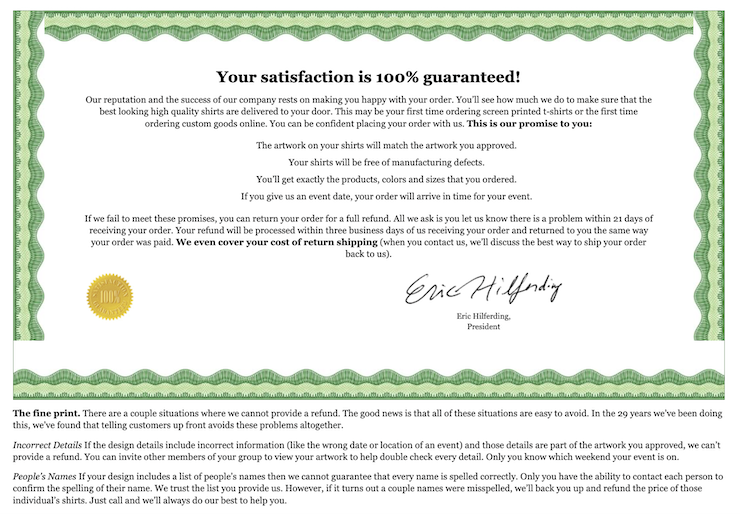
Presenting their guarantee as a certificate is a clever marketing strategy, as it’s easy to read and looks more customer-friendly than many official policies.
But their policy is still very thorough, and they even include ‘The Fine Print’ directly underneath the certificate, so consumers don’t miss it.
If you decide to display your policy in a unique or clever way, make sure it’s thorough and complete, like ClassB.
Dell’s Limited Money Back Guarantee
Another good sample of a money back guarantee comes from Dell Computers.
As shown in the screenshot below, Dell offers a limited 30-day money back guarantee that only applies to specific items.

Users who scroll below these instructions find a video walking them through the return policy and process.
There’s also a list of frequently asked questions that appear as drop-down tabs, one of which features their return policy in full, pictured below.
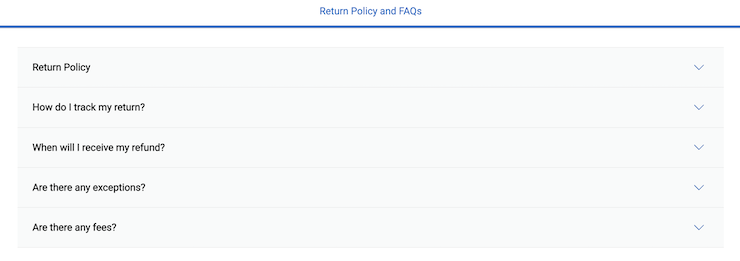
Dell’s money back guarantee is easy to read and features plenty of relevant information, so consumers know exactly what they can return and how long of a window they have to make that choice.
If your guarantee has some limits, follow Dell’s lead and be upfront about those restrictions.
Xfinity’s 30-Day Money Back Guarantee
Another example of a money back guarantee with some limitations comes from the telecommunications company Xfinity.
Their 30-day money back guarantee applies to most of their home services, including cable TV, internet, and home security.
But, for mobile services, they offer a 14-day money back guarantee.
You can read their whole policy in the screenshot below.
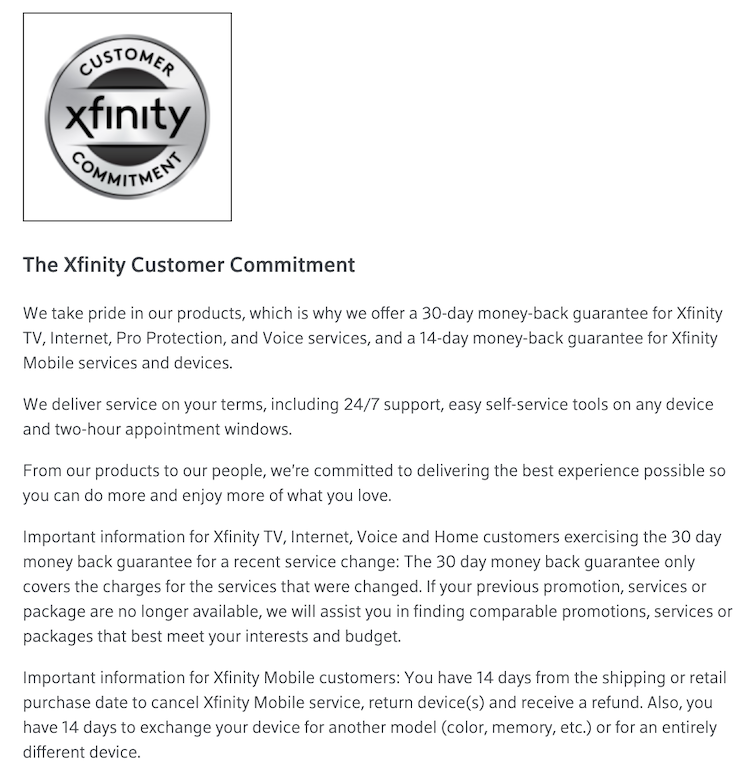
Like Xfinity, you can provide different versions of a money back guarantee for different products or services.
Just be straightforward about what timeline applies to which products and services.
Summary
A money back guarantee is a great way to incentivize new customers to make a purchase on your website.
It shows confidence in your products and services and builds trust with users.
Regardless of how strict or generous your returns and refund process may be, the most important thing is that you’re transparent about it with customers.
You can generate a return policy today that covers all the details consumers are looking for about your return and refund process — including money back guarantees.


